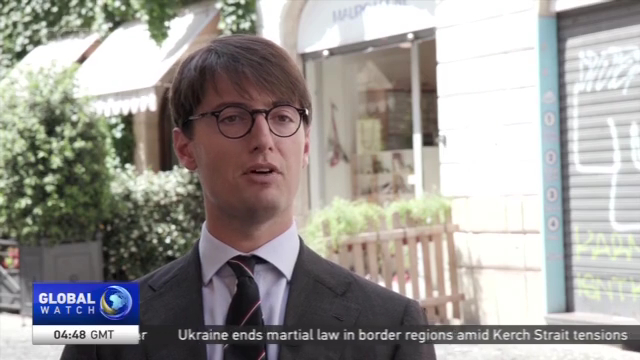
16:14, 28-Dec-2018
Italy Political Change: Draft budget and immigration policy top calendar
Updated
15:48, 31-Dec-2018
03:15

Italy has been at odds with the EU over its draft budget, and opponents have slammed the government's hard stance on immigration. CGTN's Natalie Carney wraps up the political changes in the country in 2018.
Italy has traveled a bumpy road this year. General elections in March failed to produce a government. It wasn't until June that a coalition was formed between the populist Five Star Movement and the right-wing nationalist La Lega. These two anti-EU parties promised economic and immigration reforms.
NATALIE CARNEY ROME, ITALY "Two major policy changes defined Italy's new populist government during its first year. Deputy Prime Minister Matteo Salvini's hard stance on immigration was unlike past governments. And the government's draft budget was at odds with European Union fiscal policies prompting concerns Italy may leave the eurozone."
While Rome promises to introduce new economic policies, the European Commission worries this will increase the country's deficit.
PROFESSOR VALENTINA MELICIANI LUISS UNIVERSITY "If you put together these reductions in taxes and at the same time the citizenship income, it means that you can not really promise also to the European Commission to respect the rules. So there is a little bit of a trade-off between following the rules and sticking to the promises the two parties have made to their own electorates."
However, after weeks of negotiations, Italy reduced its 2019 spending plan from two-point-four percent of GDP to about two percent, narrowly avoiding a mandate to correct an excessive deficit and potential heavy fines.
Italy also revised its economic growth outlook down to one percent. Meanwhile, a change to the country's immigration policies brought it more in line with other right-leaning EU neighbors. In early December, a controversial new anti-migrant law said to bring security back to the country, was passed by the Italian parliament, despite fierce criticism from opponents.
PROFESSOR ALBERTO CASTELVECCHI LUISS UNIVERSITY "People with no future, they come to Italy. They concentrate mostly in Rome, in Milan, in the big industrial centers. So even if it's just a few, they are much more visible. I feel threatened by street criminals. And it's this sense of being unsafe that's dominating the Italian political scene."
Yet, some believe Italy's new populist direction could have far-reaching effects.
FRANCESCO GALIETTI ECONOMIST & CEO, POLICY SONAR "I think what is happening in Italy is inevitably going to affect the entire architecture of the EU and the Euro. It's a reflection of the changing mood in continental Europe. Italy is one country in Europe where politics is no longer about right versus left. It's more these days about establishment versus anti-establishment."
And this could well bring even more challenges to the European Commission through 2019. Natalie Carney, CGTN, Rome, Italy.

SITEMAP
Copyright © 2018 CGTN. Beijing ICP prepared NO.16065310-3
Copyright © 2018 CGTN. Beijing ICP prepared NO.16065310-3